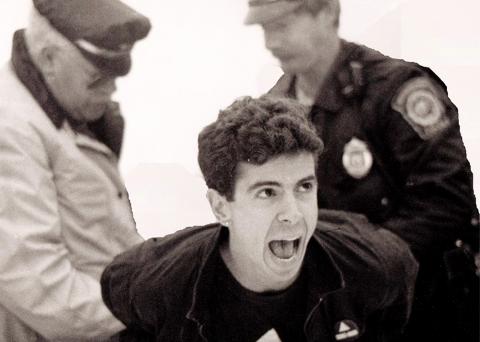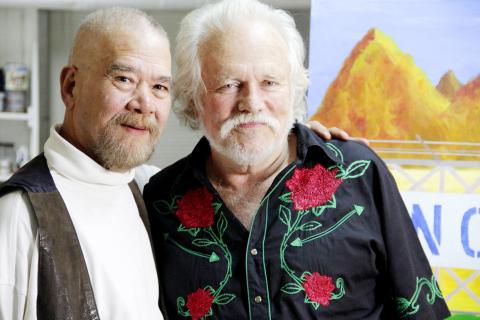While the LGBT community eagerly anticipates the 12th Taiwan LGBT Pride (台灣同志遊行) parade set for Oct. 25, the Taiwan International Queer Film Festival (台灣國際酷兒影展, TIQFF) launches its first edition this weekend with a lineup of 60 feature, documentary and short works from 30 countries. With venues in Taipei and Greater Kaohsiung, the festival aims to bring more visibility to the LGBT community through audience-friendly films, a competition and a production workshop given by industry professionals from Taiwan, South Korea and the US.
“People think gay men are all about flesh and parties ... We want to show that there is a lot more going on than partying, and that there are a lot more sexual and gender identities than gay and lesbian,” festival co-director Jay Lin (林志杰) told the Taipei Times.
The festival will screen works that address a wide range of issues and topics faced by not only gays, but transsexuals, cross-dressers and other gender-variant people. Topics include family, aging, relationships and HIV/AIDS. While conservative Christians may find it hard to believe, some actually offer wholesome, family entertainment.

Photo courtesy of TIQFF
G.B.F., for example, is an American teen comedy about a gay teenager fought over by three popular girls, who all agree that a “gay best friend” is the trendiest personal accessory.
The award-winning documentary How to Survive a Plague compellingly documents the early days of the AIDS epidemic and the struggles Aids Coalition to Unleash Power (Act Up) had with authorities.
Peter Staley, founder of Act Up affiliate Treatment Action Group and who is featured prominently in the documentary, will attend question-and-answer sessions as well as forums joined by local LGBT-rights activists and NGO leaders.

Photo courtesy of TIQFF
Apart from film screenings, festival organizers hope to establish a network among filmmakers and industry movers and shakers.
Taiwan International Media and Education Association (台灣國際影音與教育協會) and Portico Media (杰德影音), a media production and distribution company, will collaborate to discuss the importance of producing LGBT-related projects within the media industry.
“Taipei is considered one of the most open and liberal cities in Asia, but there are relatively few LGBT-themed films made here ... We want to set up a platform through which filmmakers and other professionals can develop material, seek funding or network,” says Lin, who is the CEO of Portico Media.

Photo courtesy of TIQFF
QUEER AWARDS
To discover and encourage new talent, the Taiwan Queer Awards (台灣酷兒獎) was launched to recognize excellence in short filmmaking in Chinese-speaking regions. Five works — all Taiwanese productions — were nominated. The award ceremony will take place on Oct. 5 in Greater Kaohsiung.
Meanwhile, an intense, two-day workshop intended for local filmmakers will focus on the production and distribution of LGBT-related works, as well as specialized topics such as how to generate LGBT content that appeals to mainstream audiences.

Photo courtesy of TIQFF
Participating speakers include television and film producer and director Kim Jho Gwang-soo from South Korea, whose four gay-themed shorts and debut feature, Two Weddings and a Funeral, will be shown at the festival, and Stephen Israel, the prolific producer behind G.B.F..
Taiwan-born, San Francisco-based filmmaker Leo Chiang (江松長) will share his experience of co-producing Limited Partnership, a documentary about one of the first legally married same-sex couples in the US. The film is on the festival’s lineup.
Lin says that the production of LGBT-related films and other media is a global trend.
“According to a report I did in March, 17 out of the top 20 TV shows in the US have gay characters or gay actors. If we take Hollywood as a trend, it will spill over to Asia, and I think the spillover to Taiwan will be the fastest [among other Asian countries],” Lin says.
“This festival doesn’t have to be fringe, but offers mainstream LGBT content for more people to see and, hopefully, helps more people to stop worrying about making LGBT works that don’t sell,” he adds.

Jacques Poissant’s suffering stopped the day he asked his daughter if it would be “cowardly to ask to be helped to die.” The retired Canadian insurance adviser was 93, and “was wasting away” after a long battle with prostate cancer. “He no longer had any zest for life,” Josee Poissant said. Last year her mother made the same choice at 96 when she realized she would not be getting out of hospital. She died surrounded by her children and their partners listening to the music she loved. “She was at peace. She sang until she went to sleep.” Josee Poissant remembers it as a beautiful

For many centuries from the medieval to the early modern era, the island port of Hirado on the northwestern tip of Kyushu in Japan was the epicenter of piracy in East Asia. From bases in Hirado the notorious wokou (倭寇) terrorized Korea and China. They raided coastal towns, carrying off people into slavery and looting everything from grain to porcelain to bells in Buddhist temples. Kyushu itself operated a thriving trade with China in sulfur, a necessary ingredient of the gunpowder that powered militaries from Europe to Japan. Over time Hirado developed into a full service stop for pirates. Booty could

Lori Sepich smoked for years and sometimes skipped taking her blood pressure medicine. But she never thought she’d have a heart attack. The possibility “just wasn’t registering with me,” said the 64-year-old from Memphis, Tennessee, who suffered two of them 13 years apart. She’s far from alone. More than 60 million women in the US live with cardiovascular disease, which includes heart disease as well as stroke, heart failure and atrial fibrillation. And despite the myth that heart attacks mostly strike men, women are vulnerable too. Overall in the US, 1 in 5 women dies of cardiovascular disease each year, 37,000 of them

Before the last section of the round-the-island railway was electrified, one old blue train still chugged back and forth between Pingtung County’s Fangliao (枋寮) and Taitung (台東) stations once a day. It was so slow, was so hot (it had no air conditioning) and covered such a short distance, that the low fare still failed to attract many riders. This relic of the past was finally retired when the South Link Line was fully electrified on Dec. 23, 2020. A wave of nostalgia surrounded the termination of the Ordinary Train service, as these train carriages had been in use for decades